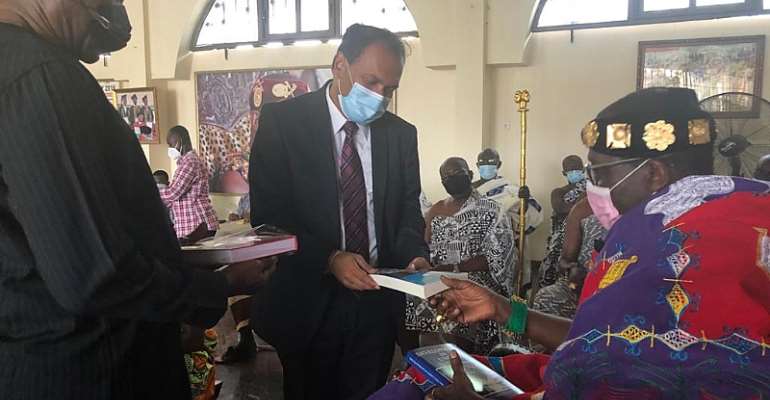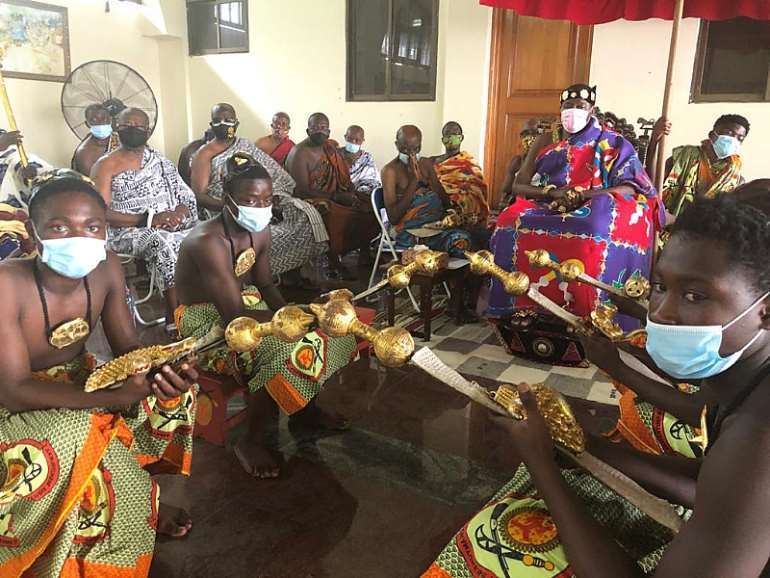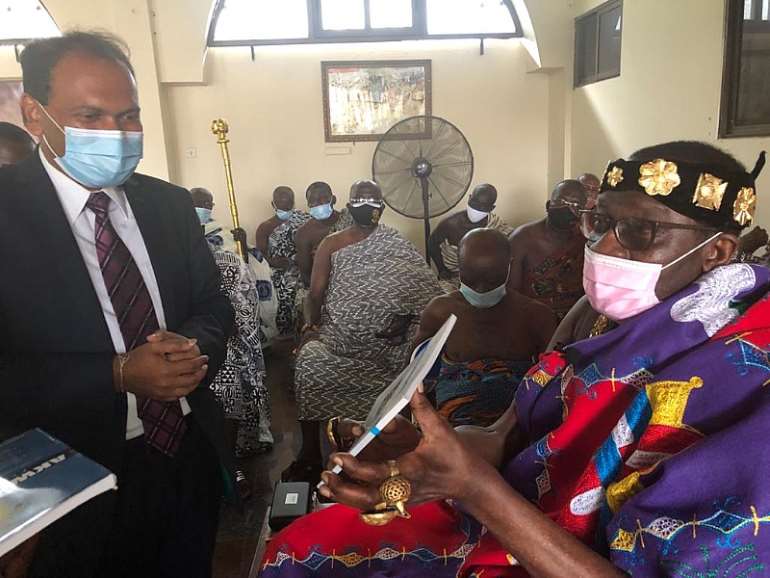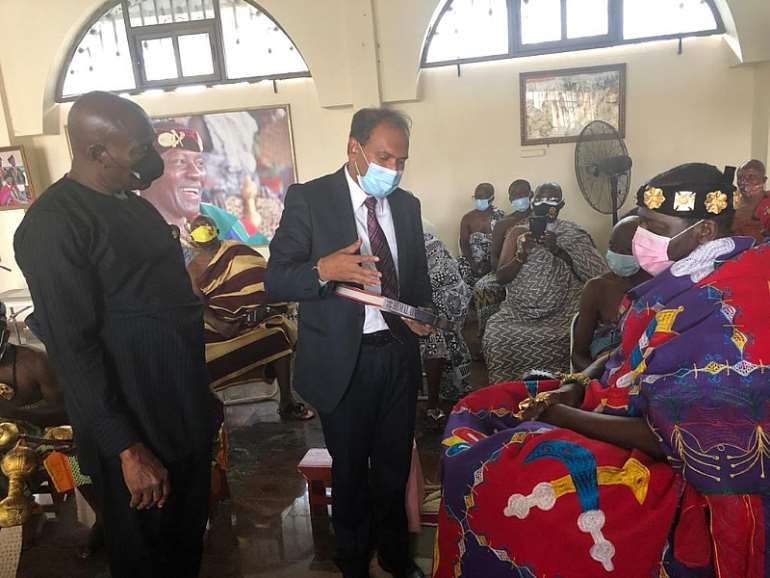
Omanhene of New Juaben Traditional Area and Former Government’s Statistician Daasebre Professor Emeritus Oti Boateng has urged Indian High Commissioner to Ghana H.E. Suganadh Rajaram to partner Root-based institutions in New Juaben Traditional Area to promote indigenous herbs and medicines as a source of exports and foreign exchange.
Daasebre Prof. Emeritus Oti Boateng’s call comes at the period the world is battling for vaccines to combat Covid-19 and other infectious diseases. According to him, promotion of such indigenous herbal development are known to have the dual positive impact on the national economy in terms of foreign exchange earnings and the basic health profile of the communities within the country.
Speaking during a courtesy call paid on Daasebre Palace in Eastern Region by Indian High Commissioner to Ghana H.E. Suganadh Rajaram on 31 January 2021, Daasebre Prof Emeritus Oti Boateng said, “Within the Root-based development framework, Traditional Areas would have the capacity to partner Government and other stakeholders for more meaningful development engagement. It is within this partnership framework that the Root-based institutions in New Juaben would like to cooperate with similar entities in India in the development and promotion of indigenous herbs as sources of medicine and export”.
He noted that, “promotion of such indigenous herbal development are known to have the dual positive impact on the national economy in terms of foreign exchange earnings and the basic health profile of the communities within the country”.
Meanwhile, the former United Nations Statistical Commission Chairman Daasebre Prof. Emeritus Oti Boateng has revealed contributions of New Juaben to community development governance in Ghana.
“Your Excellency, on July 12, 2019, the New Juaben Traditional Council took a momentous decision to implement the award-winning Root-based Development Model (RBM), developed by the speaker, which offers a credible alternative to address development problems, particularly in Africa and regions of emerging economies”.

According to Daasebre Professor Emeritus Oti Boateng, the Root-based Model introduces the concept of building sustainable community development from the bottom-up approach to ensure that the citizenship within the communities become the resource base and centre of sustainable development. It also addresses the importance of harmonising the traditions and culture of the indigenous people integrated with modern approaches as the basis of sustainable community development and governance.
“RBM introduces the new concept of development which goes beyond economic growth and other income-related variables to include the three core-values of life sustenance, self-esteem and freedom. It defines the basis of the Citizens Sector, introduced in the model, as the key sector for citizens-led community development that would play an effective complementary and partnership role to Government and the Private Sector in community development. The model provides enormous benefits to all the three sectors – public, private and citizens sectors, – as well as the implementing Traditional States in a win-win scenario.

“Ultimately, the Root-based development model is to serve as the basis for a new community development order in Ghana, Africa and regions of growing economies. In effect, it is a home-grown model which seeks to empower community development beyond aid to attain self-security, self-reliance, self-determination and self-sufficiency. The book on Implementing the Root-based Development, is now available at Amazon.
“Your Excellency, it is my humble postulate that the award-winning Root-based Development Model holds the real key to the economic liberation of Africa and all regions of emerging economies”.
Daasebre Prof. Emeritus Oti Boateng has presented his 2-4 book trilogy- Development in Unity Volumes 1, 2 and 3 to the Indian High Commissioner, the Akwantukese book to the Indian High Commissioner, UN Statistical Commission booklet which honours him and 32 other distinguished chairpersons of the Commission to the Indian High Commissioner. H.E. Suganadh Rajaram, India High Commissioner to Ghana after accepting the presentations has also presented a magnificently illustrated volume, Lands of the Himalayas, to Daasebre Oti Boateng.

Read full statement below:
ADDRESS BY DAASEBRE PROF. EMERITUS OTI BOATENG, OMANHENE OF NEW JUABEN, DURING A COURTESY CALL BY THE INDIAN HIGH COMMISSIONER TO GHANA ON 31ST JANUARY 2021.
Your Excellency, Suganadh Rajaram, India High Commissioner to the Republic of Ghana,
Nananom
Members of the Root-based Institutions
Distinguished Guests
Members of the Media
Ladies and Gentlemen.
Ghana and India, with a shared colonial past, have enjoyed strong and traditionally warm and friendly bilateral relations laid by our two great leaders, India’s first Prime Minister, Pt. Jawaharlal Nehru, and Ghana’s first President, Dr. Kwame Nkrumah.
Since then, there have been constant ministerial meetings, commercial exchanges and cultural relations such as ‘Saptarang” by Neeru Sabharwal Group which performed in Accra, Koforidua and Kumasi between 11th and 13th March 2017.
The speaker has had long standing relationship with Indians since the mid-1950s when he fraternised with Management of Bombay Bazaar in Kumasi and associated with several Indian Colleague Statisticians during his postgraduate days at the London School of Economics in the mid-1960s. Indeed, one of these colleagues spearheaded the speaker’s drive to the Chairmanship of the United Nations Statistical Commission which made Ghana the first African Country to chair the Commission in March 1987.
In 1983, the speaker was lucky to travel with and share statistical insights with one of the greatest Indian Statisticians and pioneer of electronic data processing, Professor V. R. Rao, from New York to Buenos Aires, Argentina, to attend the 46th Biennial Session of the International Statistical Institute.
In 1976, Professor Rao chaired the only ever session of the United Nations Statistical Commission held outside a UN duty station, in New Delhi, following an invitation from the Government of India. The Global Statistical Community is deeply appreciative of the warm reception received by the Prime Minister Indira Ghandi in Parliament House and the subsequent visit to the iconic Taj Mahal mausoleum in Agra.
The Chiefs and people of New Juaben, therefore, welcome Your Excellency to our Palace in Koforidua with cordial hands of fellowship.
Contribution of New Juaben to Community Development Governance
Your Excellency, on July 12, 2019, the New Juaben Traditional Council took a momentous decision to implement the award-winning Root-based Development Model (RBM), developed by the speaker, which offers a credible alternative to address development problems, particularly in Africa and regions of emerging economies.
The RBM introduces the concept of building sustainable community development from the bottom-up approach to ensure that the citizenship within the communities become the resource base and centre of sustainable development. It also addresses the importance of harmonising the traditions and culture of the indigenous people integrated with modern approaches as the basis of sustainable community development and governance. It introduces the new concept of development which goes beyond economic growth and other income-related variables to include the three core-values of life sustenance, self-esteem and freedom. It defines the basis of the Citizens Sector, introduced in the model, as the key sector for citizens-led community development that would play an effective complementary and partnership role to Government and the Private Sector in community development. The model provides enormous benefits to all the three sectors – public, private and citizens sectors, – as well as the implementing Traditional States in a win-win scenario.
Ultimately, the Root-based development model is to serve as the basis for a new community development order in Ghana, Africa and regions of growing economies. In effect, it is a home-grown model which seeks to empower community development beyond aid to attain self-security, self-reliance, self-determination and self-sufficiency. The book on Implementing the Root-based Development, is now available at Amazon.
Your Excellency, it is my humble postulate that the award-winning Root-based Development Model holds the real key to the economic liberation of Africa and all regions of emerging economies.
Cooperation for Development of Indigenous Herbs.
Within the Root-based development framework, Traditional Areas would have the capacity to partner Government and other stakeholders for more meaningful development engagement.
It is within this partnership framework that the Root-based institutions in New Juaben would like to cooperate with similar entities in India in the development and promotion of indigenous herbs as sources of medicine and export. Promotion of such indigenous herbal development are known to have the dual positive impact on the national economy in terms of foreign exchange earnings and the basic health profile of the communities within the country.
Presentation
Your Excellency, I now have the pleasure to present to you my book trilogy, Development in Unity Volumes 1, 2 and 3, which forms the basis of the Root-based development hypothesis, the book on Akwantukese Festival upon which the Root-based implementation strategy is anchored, and a booklet by the United Nations Statistical Commission honouring 33 global statisticians who had guided the Commission’s work in its first 70 years.
Once again, on behalf of the New Juaben Traditional Council, I welcome you to our region and look forward to establishing a long standing relationship between our Traditional Council and the people and Government of India.
Thank You



